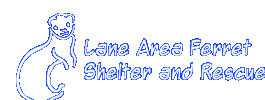Ferret Diseases and Conditions
Adrenal Disease
Adrenal gland tumors are a common problem for ferrets over three years of age. The adrenal glands are important hormone-producing glands which are located near each kidney. These tumors may be benign or malignant, but in either case the symptoms are the same, due to the production of abnormal amounts of hormone and hormone precursors from the tumor. The progress of this disease is slow, and affected ferrets may live two or three years after symptoms start.
The most common early symptom of adrenal tumors in the ferret is hair loss. This hair loss can involve the tail, back, sides, and abdomen, but generally hair of the face and legs remains. The skin may become visibly thinner in these bare areas. Muscle loss is common in affected ferrets, so that bones of the vertebrae, pelvis and ribs become prominent below the skin, and the weight loss can be dramatic. Females with adrenal tumors will often develop symptoms of estrous (enlarged vulva) even though they have been spayed previously, due to the effect of sex hormones from the tumor. Males may develop cystic enlargement of the prostate gland which can cause them to strain while urinating.
Diagnosis of adrenal tumors can usually be made on the basis of finding these characteristic symptoms. Blood profiles, x-rays, and urinalysis are usually normal, and special adrenal gland tests used in other species to diagnose adrenal tumors (e.g., ACTH response tests, dexamethasone suppression tests) are of limited use in ferrets. A blood test to assay estradiol and related steroid hormone levels is a new and promising approach.
The treatment most commonly recommended for adrenal tumors is surgical removal. If the mass is benign (adenoma), or if the mass is malignant but has not yet spread elsewhere, surgery can solve the problem. The return of hair growth, body weight and activity level can be dramatic within a few weeks of surgery. This surgery involves exploring the abdomen and removing the affected adrenal gland. In cases where surgery is unsuccessful or not elected, treatment with the drug lysodren may be helpful for a time in reducing symptoms of these tumors.
